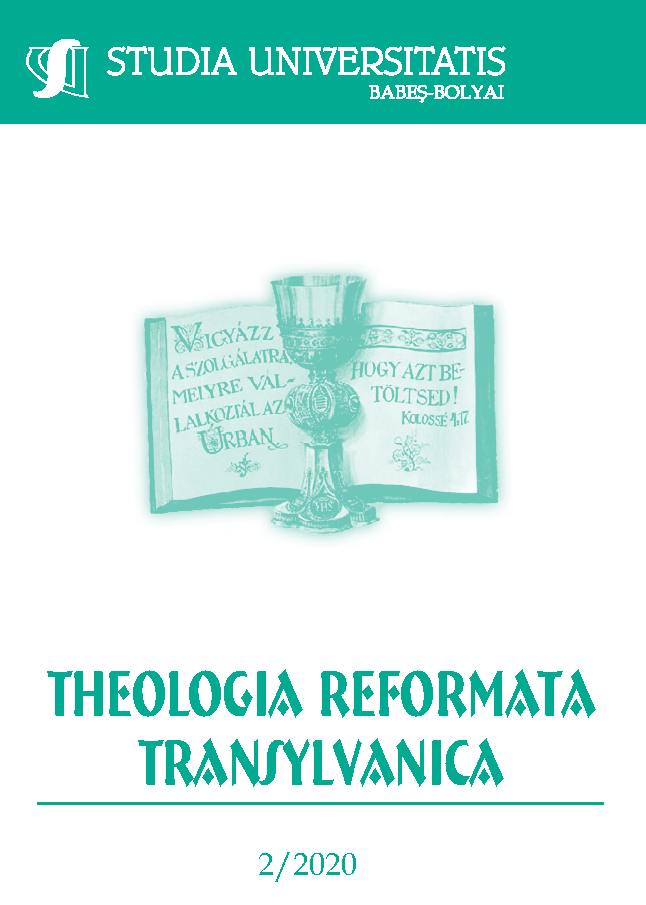Identity, Denomination, and Nationality
DOI:
https://doi.org/10.24193/subbtref.65.2.12Keywords:
the content of identity, energy of the protective spirit, dominant church, non-democratic church, valve system.Abstract
Identity pins down accurately who individuals are in relation to God, society, and themselves. God’s statement about Himself (His self-identity) in the Bible “I am who I am” can guide us to find our own “I am who I am”, definitely taking into account the analogia relationis rather than the analogia entis. The constant dominant of our human identity as God’s identity as well is that we stay humans despite all circumstances, but its features (“our qualities”) are variable. We are only interested in two of the many identity features: our denomination and our Hungarian ethnicity, which are “only” features, but as such they have been decisive. In the 20th century, we, as Reformed Protestants and Hungarians, got under the burden of the political and ecclesiastical consequences of the two world wars. Our faith required that the church and the Hungarians did not lose their identity features from the perspective of the communities and individuals. During the interwar period (1920–1944) and during the totalitarian regime (1945–1989), we, Transylvanian Reformed Protestants, had one single duty to fulfil: clarify our relationship vis-à-vis the political authority in such a way as to remain disciples and a disciple church without which we are not the ones who we must be. In his prayer, Jesus does not ask the Father to take all of his followers out of this world (meaning society) but rather to defend them from evil (John 17:15). How can we fulfil it? Our yes/no answer is the issue of gratitude towards God and penitence before Him.
References
ADORJÁNI, Zoltán (1996): Imre Lajos (1888–1974). In: Kozma, Zsolt (ed.): Akik jó bizonyságot nyertek – A Kolozsvári Református Theológia tanárai 1895–1948. Cluj-Napoca, Kolozsvári Protestáns Teológiai Intézet. 235–276.
JUHÁSZ, Tamás (1996): Tavaszy Sándor (1888–1951). In: Kozma, Zsolt (ed.): Akik jó bizonyságot nyertek – A Kolozsvári Református Theológia tanárai 1895–1948, Kolozsvár, Kiadja a Kolozsvári Protestáns Teológiai Intézet, 277-318.
K. JAKAB, Antal (1998): Magyar Irodalom Bánffy Miklóstól Szilágyi Domokosig. Cluj-Napoca, Stúdium.
KOZMA, Zsolt (2007a): Isten országának peremén. In: Másképpen van megírva. Cluj-Napoca, Erdélyi Református Egyházkerület. 67–72. (2007b): Keresztyén és nemzeti önazonosságunk. In: Másképpen van megírva. Cluj-Napoca, Erdélyi Református Egyházkerület. 181–190.
LÁSZLÓ, Dezső (1997): A kisebbségi lét ajándékai. Posthumus edition. Cluj-Napoca, Minerva Művelődési Egyesület.
MAKKAI, Sándor (1937): Nem lehet. In: Láthatár 1937/2. Budapest.
MOLNÁR, János (2014): Szigorúan ellenőrzött evangélium. Vol. I–IV. Cluj-Napoca, Kriterion.
REMÉNYIK, Sándor (2005) [1935]: Ahogy lehet. In: Reményik Sándor összes verse. Vol. I. Budapest–Kolozsvár, Polis–Kálvin–Luther. 640.
TABÉRY, Géza (1931): Protestáns szellem a magyar közéletben. Református Szemle XIV.
TAVASZY, Sándor (1929): Keresztyénségem és magyarságom. In: Kálvinista világ III. 2. 12–14. (1932): Református Keresztyén Dogmatika. Kolozsvár, Minerva. 192.
Downloads
Published
How to Cite
Issue
Section
License
Copyright (c) 2020 Studia Universitatis Babeș-Bolyai Theologia Reformata Transylvanica

This work is licensed under a Creative Commons Attribution-NonCommercial-NoDerivatives 4.0 International License.






